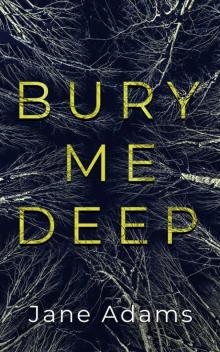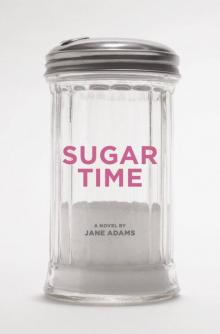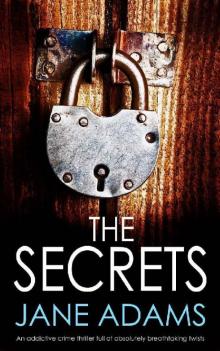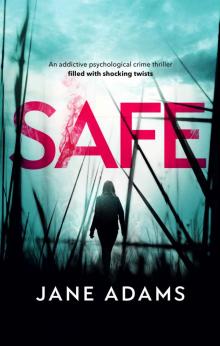- Home
- Jane Adams
Sugar Time
Sugar Time Read online
Copyright © 2009 Jane Adams
Permission to reproduce or transmit in any form or by any means, electronic or mechanical, including photocopying and recording, must be obtained by contacting Jane Adams at the email [email protected].
All rights reserved.
Credits
Design: Methodologie
Author Photo: Emma Lewisohn
10 Digit ISBN: 1-4392-3761-1
Kindle ISBN: 978-1-61550-191-5
13 Digit EAN: 9781439237618
Library of Congress Control Number: 200990372
BY JANE ADAMS
NOVELS
Tradeoffs
Good Intentions
Seattle Green
NONFICTION
Boundary Issues
When Our Grown Kids Disappoint Us
I’m Still Your Mother
Wake Up, Sleeping Beauty
How to Sell What You Write
Making Good: Conversations with Successful Men
Women on Top
Sex and the Single Parent
PLAYS
The Promised Land
CONTENTS
TITLE PAGE
COPYRIGHT PAGE
CHAPTER ONE
CHAPTER TWO
CHAPTER THREE
CHAPTER FOUR
CHAPTER FIVE
CHAPTER SIX
CHAPTER SEVEN
CHAPTER EIGHT
CHAPTER NINE
CHAPTER TEN
CHAPTER ELEVEN
CHAPTER TWELVE
CHAPTER THIRTEEN
CHAPTER FOURTEEN
CHAPTER FIFTEEN
CHAPTER SIXTEEN
CHAPTER SEVENTEEN
CHAPTER EIGHTEEN
CHAPTER NINETEEN
CHAPTER TWENTY
CHAPTER TWENTY ONE
CHAPTER TWENTY TWO
CHAPTER TWENTY THREE
CHAPTER TWENTY FOUR
CHAPTER TWENTY FIVE
CHAPTER TWENTY SIX
CHAPTER TWENTY SEVEN
I was watching a Seinfeld re-run and picking at some leftover kung pao chicken when an octopus curled its tentacles around my midsection and squeezed. I should have thrown this food out two days ago, I thought, and then the octopus squeezed again and took my breath away. Beads of sweat popped out on my forehead and my skin went all damp and clammy. Great. A hot flash and heartburn at the same time. Welcome to modern maturity. That’s the time between your first copy of the AARP magazine and your first social security check, when you start getting used to the idea that you’re not only not middle aged any longer, you’re old. Unless you expect to live forever, of course—which, up to then, you sort of do.
There was a little pink bottle of Pepto-Bismol in a striped ditty bag in the bathroom that I’ve carted all over the world in case I get sick from eating food from the street, which I never have and always do; my philosophy is, if you’re going to play it safe, you might as well stay home. But I couldn’t get to it—a wave of torpor held me down on the couch like an invisible force field. After a few minutes the octopus seemed to relent, so I tried moving. But then it snaked itself around my ribcage and let me know it was still there.
The phone rang, but there was no way I could reach it—it was only a couple of feet away but it might as well have been in the apartment next door. It rang seven times before voice mail finally kicked in; I counted them while I tried to remember how long ago I’d ordered in that chicken.
Maybe it wasn’t food poisoning; it might be a kidney stone. I’ve never had one, but once on a flight from L.A. the man in the aisle seat told me in excruciating detail how he’d once passed one on the seventeenth green. Actually, I don’t remember whether it was a kidney stone or a gallstone, only that when the stewardess held out the little cup of olives for his martini, the way they used to in first class, he’d just gotten to the part about how he still managed to finish the round a respectable three over par. He didn’t say that passing a stone felt like a contraction that went on and on, although to be fair, he couldn’t have known that. But he also didn’t seem the type who’d asked his wife how it really felt to birth little Tiger Woods Junior, either.
I took shallow, silent little breaths so the octopus wouldn’t notice, and let go of the remote; for some reason I’d muted the TV when the octopus struck, and when the phone stopped ringing it was suddenly unnaturally silent in the room. I felt alone and abandoned, like I’d fallen overboard without anyone on deck noticing while the boat disappeared over the horizon; when I turned the volume on again my arm tingled the way your foot does when you try to move it after it’s fallen asleep, and then the tingle heated up a couple of hundred degrees and radiated in waves down to my fingers.
“Oh shit,” I said out loud, “I’m having a heart attack!”
Tory looked up from her pillow—not hearing any magic words like ‘Let’s go out,’ or ‘Do you want a treat?’ she went right back to doggy dreamland. It was beginning to dawn on me that if I didn’t do something, call someone, get myself moving, I was going to die right here, all by myself, on a faded green velvet sofa surrounded by greasy white cardboard containers, a half empty can of Diet Coke, and the latest issue of Vanity Fair. Shuffle off this mortal coil in my ratty old sweats, irony of ironies, to the theme song from Going It Alone, which follows Seinfeld on weeknights on Nick at Nite. Live by TV, die by it, I used to say. But please, God, I didn’t really mean it.
I managed to drag the phone over, but then I couldn’t decide who to call. Ignoring the mocking voice in my head—Help, you’ve fallen and you can’t get up, call 911, what are you waiting for?—I pushed “6” on the speed dial instead. I’d rather be dead than carted through the lobby on a gurney under the rheumy gaze of Mrs. Bosenberg, who lives in One A and keeps an eye on the lobby, just in case Louie the night doorman is sleeping on the job.
Mrs. B.’s apartment is rent-stabilized, which means they can’t throw her out. So is mine, and the only way anyone ever leaves a rent stabilized apartment in New York, especially a classic five on the upper West Side, is feet first. After the relatives of the deceased have finished sitting shiva, the owners haul away all the dark, heavy furniture and slap on a few coats of paint and then they put the place on the market for a sum that could foment a revolution in an African backwater. Since nobody was doing that to my stuff, especially not until I took my vibrator out from under the bed, cleaned out my stash of recreational drugs, and threw away some pictures I’d just as soon nobody saw, I’d rather let Mrs. B. think I was catching the red-eye to the coast.
I’d managed to hold onto the apartment even after I moved to L.A. Every month when I sent the management company the rent, which was less than people pay their gardeners out there, I thought of it as a hedge against having to grow old in a place where women over 21 are invisible unless they’re very powerful, and even then they have to file an environmental impact study before going out in public.
I slid my feet into a pair of well-worn Tod’s and pulled an old suede jacket around me, clutching it tightly while the octopus let up enough for me to inch my way to the elevator in slow, clumsy steps. By the time the doors opened downstairs in the lobby, though, it was back, and this time it was really pissed off.
Getting to the front door seemed to take forever. I was glad Louie was off getting stoned in the basement with his brother-in-law the super instead of guarding the door. One look at me and he’d be calling the real estate brokers to tell them there was a vacancy coming up in the building.
The gray Lincoln town car was already waiting at the curb. Somehow I managed to get into the back seat without collapsing on the sidewalk. The driver didn’t even turn around.
“Where to?” he asked.
As a rule, your better Manhattan hospitals
are on the east side, but since Roosevelt-St. Luke’s was the closest that’s where I told him to take me. “The emergency room entrance,” I added.
I wasn’t hurting so much and I was breathing a little easier so I called Teddy from the car. He’s a gay actor who lives on my block and has a key to my apartment in case I’m tied up and can’t get home to feed and water Tory. I left him a message asking him to take care of her until I called him and then we were at the hospital. The driver leaned over me and opened the door; an orderly who’d been catching a surreptitious toke a few feet from the entrance pinched off the tip of his joint and pocketed it before he looked me over, said “Right back,” and returned a few seconds later with a wheelchair, still trailing the punky odor of dope.
After that it’s mostly blank. I think I passed out somewhere between “Do you have an insurance card?” and “What seems to be the problem?” because the next thing I remember was blinking away the bright light that was shining in my eyes.
A youngish, balding guy in wire-rimmed glasses and green pajamas bent over me.
“Dr. Greene, good to see you again.” My voice sounded in my ears as if it was coming from a long way away. “I was really sorry when you got that brain tumor and died.” And then my eyes closed again and they stayed that way until some time later—fifteen minutes, an hour?—when I woke up with a tube in my nose, an IV in my arm and a bitter taste in my mouth. The bald guy was back. Or maybe he’d never left. “Do you know where you are?” he asked.
Miraculously, it seemed, the pain had retreated. I took a deep breath of heavily processed air—not nitrous, unfortunately, just plain old oxygen, but I was grateful nonetheless. “County General? Seattle Grace? St. Elsewhere?” If my head wasn’t so fuzzy, I could have reeled off a few more. But I could tell he wasn’t sure if I was kidding or hallucinating.
“You’re at Roosevelt-St. Luke’s. I’m Dr. O’Neill, the attending cardiologist.”
“O’Neill? What kind of name is that for a cardiologist? Get me a Bernstein or a Goldberg.” I can’t help it—when I’m nervous or scared, I resort to shtick. Okay, even when I’m not nervous and scared. When you don’t know what else to say, shtick gets you by until you can come up with something better. Not that there is anything better most of the time, at least in my estimation. But what else would you expect from the girl voted “Class Clown” in high school?
“Sorry, but I’m taking their calls tonight,” he said.
Now I wasn’t sure whether he was kidding.
“I guess it wasn’t the kung pao chicken, was it?”
“Not unless you eat it all the time.”
“Not all the time. Sometimes I have sweet and sour spareribs or hoisin lamb.”
“We’re going to have to do something about that,” he said, frowning.
Sure, let’s sue Empire Szechuan. I could almost hear my ex-husband suggesting it. That’s what he does. Like Pavarotti sings and Barry Bonds bats, Ted sues. It wasn’t always like that. When I met him, he was a struggling Legal Aid lawyer. Now the only thing he fights is tort reform.
“Did I have a…” I couldn’t say it. “What happened?”
“That’s not entirely clear. We’re not ruling anything out yet. We’re waiting on some blood work. Your ECG is a little spiky, but you responded to the nitro, which is good. It might just be angina. Or maybe a little heart attack. Think of it as a wake-up call. A warning.”
Some warning. Usually all it takes for me to give up Chinese food is not being able to zip up my jeans.
“We’ll know more in a little while,” O’Neill said. “We’re going to monitor you pretty closely for the next 24 hours. Is there someone one you’d like us to contact—a family member?”
I shook my head.
“Really? How about a friend or neighbor?”
“No,” I said. “Don’t call anyone.” Twenty-four hours I could deal with. Any longer than that and I’d have to think about what I was going to tell the people who really needed to know. Once I figured out who they were, that is.
When Jessie went to South America to study weaving or learn Spanish or whatever it was that convinced me to say yes, I made her promise never to have anyone call me from a hospital and ask if I was her mother.
“Why not?” she wanted to know.
“I’d fall apart if that happened.”
“You’re right—I’ll tell them not to call ‘till I’m dead.”
“Bite your tongue. Just don’t even tell me you were there until later. Much later. Never would be fine, too. Or when you’re completely okay.”
“But what if I’m not?” She was stubborn, my kid.
“Then tell me when you are.”
“How can I if I’m dead or unconscious?”
“You won’t be. You’ll be fine.” Thus do mothers beseech the universe, taking it on faith that someone is listening—if you couldn’t, you’d never let them out of your sight.
No, I didn’t want the doctor to call Jessie. Especially since she was pregnant. Besides, it didn’t look like there was any need to worry her. A warning, he said. That’s all. Just a warning.
“How much longer am I going to be here?” I asked.
“We’ll know more tomorrow.”
“Then I’ll call someone tomorrow.”
The rhythmic whooshing noise might have been train wheels that were somehow connected to the last fragment of a dream that dissipated when I woke up. I could tell it was morning by the thin gray light creeping in through the vertical window shades; my watch was gone, replaced by a white plastic bracelet with my name on it.
“Doctor will be glad to see you’re awake. He’s been in twice already.” A heavy-set black woman with a white starched pancake on her head was doing something to a plastic clothespin that was clamped to my middle finger and attached to the machine responsible for that whooshing sound. Every few seconds it emitted a little beep, like a smoke detector with a failing battery.
“What time is it? Can I get some coffee? Do I really need to be hooked up to that thing?”
“Until Doctor says it’s okay and we move you out of the CCU,” She pronounced “Doctor” so reverently she might have been talking about God; in my estimation, only English novelists should be allowed to use a job description like a proper noun. “Until then, we need to keep an eye on your numbers,” she added.
Is that what I’d been reduced to, I wondered—numbers? What about the actual person, the human being in this bed who’s dying for a cup of coffee and needs to pee in the worst way—what about her? What can a bunch of numbers tell you about Sugar Kane, an accomplished, even a successful woman, a great broad, a funny dame, yes, a woman of a certain age, (which sounds so much sexier and more mysterious, if somewhat less specific in French, which is the point, right?) but still, somebody’s mother, somebody’s daughter, somebody’s lover…. well, not currently, maybe, but that’s not the point: What happened to Sugar nee Charlotte Sugarman, who became Sugar Kane when she married her college boyfriend because she couldn’t convince him to change it back to Kantrowitz, not after his father Irving went to all that trouble to make people think they were born Unitarian? Sure, it sounds like a bleached blonde stripper or a Tri Delt from Ole Miss, but it’s who I’ve been since I was 22 and by the time we split up it was the kids’ last name, too. Besides, let’s face it, people remember a name like that: “Sugar Kane? Oh yes, isn’t she the one who did Going It Alone?” In L.A. people know you by your credits but a catchy handle don’t hurt, as they say. (As who says, I can hear you asking, and as a matter of fact, it was a guy I once played gin rummy with all night when a snowstorm grounded every flight out of JFK).
Where’s the woman who came in here a few hours ago with seventy nine pairs of shoes in her closet, one Emmy in a bathroom on West 79th Street and the other in a box in a basement in Laurel Canyon? Who’s the broad with a picture of a blurry little shadow on an ultrasound in a corner of her bathroom mirror, who any second now is going to burst into tears because she just
realized maybe she’s never going to find out whether it’s a boy or a girl, not to mention buying it that cute little leather jacket in the window of Baby Gap? What happened to her, huh? Or, as a great communicator and second-rate actor once said, “Where’s the rest of Me?”
I didn’t say any of that to Nurse Nancy, though—I’m not kidding, that was her name, it said so right on the tag over her pocket. I just said, I really have to pee, so could you please bring me a bedpan or disconnect me?
She unclipped the clothespin and steadied me while I stood up. I was a little weak in the knees but I made it to the bathroom. I splashed some cold water on my face and looked in the mirror over the sink, expecting a reasonable facsimile of my usual self—almond-shaped brown eyes and high cheekbones, the only valuables my great grandmother managed to take with her when she was chased out of Minsk in a pogrom; a mouth usually described as big even when it’s closed, which isn’t often, but which on anyone but a New Yorker would simply be called generous; light brown hair, only three days earlier streaked and highlighted with three different colors and layered and feathered into this year’s version of the same medium short style I’ve worn most of my life except during my Carly Simon period.
But the woman who stared back at me in the unforgiving light of the bathroom didn’t look like me. Her flesh seemed to have gone slack overnight and come loose from its moorings, especially under her eyes, which receded back into the sockets. The cartography of her face was different, too, as if a mighty river had overrun its banks and carved new channels into the surrounding landscape. Her skin was dry and crackled like parchment. She looked frail. She looked old.

 The Greenway
The Greenway Detective Mike Croft Series Box Set
Detective Mike Croft Series Box Set BURY ME DEEP an utterly gripping crime thriller with an epic twist (Detective Rozlyn Priest Book 1)
BURY ME DEEP an utterly gripping crime thriller with an epic twist (Detective Rozlyn Priest Book 1) Sugar Time
Sugar Time THE UNWILLING SON an absolutely gripping mystery thriller that will take your breath away
THE UNWILLING SON an absolutely gripping mystery thriller that will take your breath away THE APOTHECARY’S DAUGHTER an absolutely gripping crime thriller that will take your breath away
THE APOTHECARY’S DAUGHTER an absolutely gripping crime thriller that will take your breath away The Secrets
The Secrets Safe
Safe